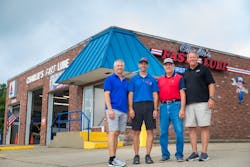Many operators get into the business with the vision of a single-store operator.
Being at the shop each day, they embody the institutional knowledge of that location and become the face of the operation. They see every customer and train quality techs. Paying attention to the details is part of the formula for success.
“You can be the quarterback. You’re there and running everything on a day-to-day basis,” says Rick Bisio. “And it’s a very specific kind of skill set to run a location.”
Bisio is a franchise coach and author of “The Educated Franchisee,”which has guided business owners to success in the franchise space for years. He says that business owners often start out in that day-to-day, managerial role.
Often, single-store operators don’t remain that way. Whether you’re in a franchised operation or not, there is a real incentive to grow your brand and expand. Bisio says that most operators focus on the financial factors. Growth brings real potential for greater revenues.
That’s important, but one of the biggest determinations of success will be how the operators adapt their own roles to meet that growth. That can also be the biggest challenge.
“Your job changes. The skill sets that are required change,” he says. “You have to get out from behind the desk and morph into a manager of people, and empower managers to run their locations.”
Take a closer look at how operators shift their focus and skills during growth spurts, and see how one successful operator has found an efficient division of duties as the business matures.
Pivot Points
In a growing quick lube network, each level of unit growth has specific challenges and needs. In the early stages of growth, what number of locations do you think is the toughest to manage?
Having worked with franchise owners in many different sectors, Bisio says that the toughest growth point might be just as things are taking off.
“Having two or three locations is probably the hardest part,” he says. “Because when you have two or three locations, you don't have the cash flow in many cases to hire high quality management.”
That’s the point when you likely still have a daily presence in your shops, because you might not be ready to add a position like regional manager or district manager. Bisio says that it’s difficult because there’s also not a lot of redundancy. If one manager needs to take time off for an extended period, the owner is right back in the mix of daily duties.
Grow your network more, and your resources might allow for more room to run, so to speak.
“When people get to four or five, they often get to 10,” Bisio says.
That’s because the cash flow allows for a regional manager. At that point, you’ve also got a bit more experience in managing multiple locations at once. And that redundancy becomes available to you.
“Any additional location becomes not plug and play, but a whole lot easier,” Bisio says. “If a location is not doing well, you can pull from another location.”
Here’s another way to think about it: The development is a lot like moving up through the management ranks yourself. At one location, you start out fulfilling the duties of store manager. At two or three, you’re effectively the district manager.
At five stores and beyond, that’s when you truly become the CEO, the company president, the owner—the person at the top of the organization. Therein lies another challenge, because your roles can end up being very different than before.
“The goal is not to be in the day-to-day operation as much as it is to watch the day-to-day operations from afar and have a perspective about what’s going on in order to grow the business and grow the people over time,” Bisio says.
Changing Your Role
Lots of operators will say that they’re in the people business, and it’s an adage that rings true in many ways. Throughout growth periods in an operation, owners should learn to manage their rank-and-file employees at the shop level, then their managers, followed by the managers of managers.
When you become the operator of a larger network, that people management is no less important. Cultivating a strong team from top to bottom is a key to retention, and a larger organization is able to show employees that there is room to grow into a career. That experience can pay dividends at each shop level.
For the person at the top of the organization, it’s crucial to set a standard of care and attention to personnel matters.
“As companies grow, hiring, managing, and motivating the right people—making sure they know what they’re doing and feel empowered—is very important,” Bisio says.
Your role shifts from overseeing each customer interaction to creating the business culture that maintains those positive customer interactions.
It’s a change that requires a shift in management style, but there’s one quality that’s required most of all: trust. Bisio says that trust is the crucial ingredient that allows owners to know that duties are being carried out in the shops so they can focus on their new big-picture roles.
“A lot of entrepreneurs never get to that point where they’re able to trust or empower employees, and if they can’t do that, they’re stuck,” he says. “You can accomplish that. If you can get to that point, then you get to the stage where you’re really working on culture. You’re working on direction and vision and finances. You start running the business in a little bit of a different way at that point.”
Case Study: Charlie’s Fast Lube
Missouri-based Charlie’s Fast Lube is a network of seven quick lubes and five tire shops, and the network has grown slowly and steadily over the years.
Co-owner Jason Glueck is a second-generation owner of the business alongside his brother, Brian Glueck. He has worked in tech roles on the shop floor and managerial roles before transitioning into co-ownership. As a family business, they had plenty of time to plan the transition.
“We started this process five years ago,” Glueck says. “We ran a three-year transition for Mom and Dad getting out of the business. So when it came to buyout time, we were already in position.”
Operationally, it was a well-planned and well-executed transition. Glueck’s went from managing the tire shop operations to being a co-owner of the entire business. His challenge was to carve out a role that would be efficient and effective while working alongside a co-owner and a lube operations strong manager, Brian Hahs.
“I was doing that on the tire side, so probably the biggest transition is I came into an office setting, working on the bigger picture.”
Division of Duties
The organizational structure at Glueck’s company is a little less common with the co-ownership. But what’s important to take away is how Glueck and his leadership team interact and carry out their roles. Like many owners, Glueck had to let go of some of the details in order to focus on the broader operational vision.
“That was kind of the transition for me,” he says.
Glueck’s company has that ingredient that is key for leaders at the top of an organization: trust. Glueck knows that day-to-day operations on the tire and lube sides of the business are being handled with care.
Perhaps more importantly, he trusts that important items of business will get brought to him to work out a solution. Likewise, there are certain topics that Glueck works on that he wants to bring to the leadership team for the final say.
“I think the biggest thing we have here in the office is some chemistry between people,” he says. “We don't always see eye to eye on everything, but we can always talk through it.”
On the lube side, that trust is placed in Brian Hahs. Glueck identified Hahs more than a decade ago as a great shop-level manager. For 12 years, Hahs has been managing operations on the lube side of the company.
Effective company leadership from Hahs’ perspective begins with that communication and chemistry.
“Communication is just the biggest part of it,” Hahs says. “If you’re not out there thinking about where the game is going, you’re going to die on the vine.”
Having that communication between a company leader, like Glueck, and a regional or district manager, like Hahs, is crucial. Hahs embodies that important link between on-the-ground details at each shop and the big-picture vision of the company leader.
Hahs excels because he forms a strong link in that position.
“As you are in the stores and you do have your feet to the ground and listen to what your guys are saying, even though you’re not doing the oil change yourself,” he says.
Key Industry Stats
Source: 2021 NOLN Operator Survey
—
- Average Owner Experience: 20 years
- Average Shop Network: 2-3
- Property Status: 59% own
- Gross Profit Margin: Less than 30%
- Manager Tenure: 9.75 years
- Tech Tenure: 3.9 years
Take Full Ownership
If there’s one true key in the transition between a one-unit owner and a 20-store operator, it’s that you’ve got to adapt the business to fit. That means making the most of your resources at every stage.
Glueck has thought about that with Hahs overseeing seven quick lube shops. There’s not necessarily a specific number that necessitates a regional-type manager, but he will know it when he sees it.
“What is the limit to that? Is it 10, 12, 15? I don’t know yet,” Glueck says. “We try to grow within reason. We don’t want to just grow to grow.”
At the same time, Bisio says that growing as a leader is an exercise in patience. Know that managers aren’t going to do things exactly like you did, though they will rely on the processes you put into place.
“For an owner, it’s patience to learn a new skill,” Bisio says. “And the new skill isn’t knowing how to change oil. The skill is how do I hire, manage, train and motivate great employees.”
That’s why the “being in the people business” adage rings so true. The oil change is a process. Customer service has standards and steps. Managing people can be a bit different, utilizing intuition and quick thinking.
“If you’ve got a good process. If you’ve got things to be able to hold accountable to, I think it works,” Glueck says.
Thankfully, your business can be the best training program.
About the Author
Matt Hudson
Content Director
Matt Hudson is the former content director for National Oil and Lube News.

